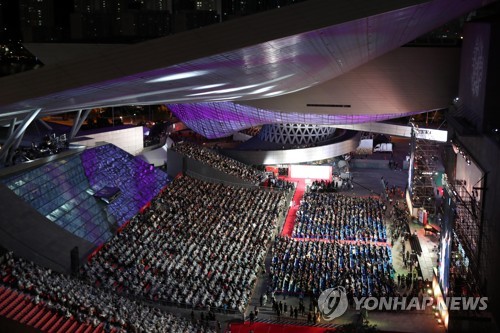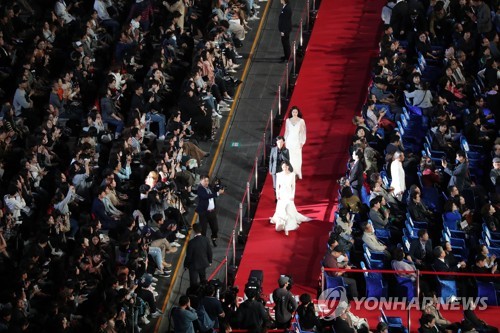- California Assembly OKs highest minimum wage in nation
- S. Korea unveils first graphic cigarette warnings
- US joins with South Korea, Japan in bid to deter North Korea
- LPGA golfer Chun In-gee finally back in action
- S. Korea won’t be top seed in final World Cup qualification round
- US men’s soccer misses 2nd straight Olympics
- US back on track in qualifying with 4-0 win over Guatemala
- High-intensity workout injuries spawn cottage industry
- CDC expands range of Zika mosquitoes into parts of Northeast
- Who knew? ‘The Walking Dead’ is helping families connect
Busan film festival opens, seeking unity after years of political turmoil
BUSAN, Oct. 4 (Yonhap) — The Busan International Film Festival (BIFF) kicked off its 23rd edition in the southern South Korean city of Busan on Thursday, seeking a “new leap forward” after nearly four years of political feuding over artistic freedom.
Co-hosted by South Korean actors Kim Nam-gil and Han Ji-min, the opening ceremony was held at the fully-packed 5,000-seat outdoor theater of the Busan Cinema Center.
Some 250 Asian actors and filmmakers hit the red carpet before festival chairman Lee Yong-kwan and executive director Jay Jeon formally opened the 10-day extravaganza in the ceremony.

View of the opening ceremony of the 23rd Busan International Film Festival at the Busan Cinema Center in Busan on Oct. 4, 2018. (Yonhap)
Three people representing the Busan metropolitan government, BIFF and the Korean film industry originally planned to declare the festival open. But as Busan Mayor Oh Keo-don was on a trip to Pyongyang, the plan was not carried out.
The mayor, instead, sent a congratulatory video message. “We proudly gathered here once again, overcoming difficulties. Nothing can stop us from loving cinema and the Busan International Film Festival,” he said in the message. “This year will become the first year of normalizing the festival and the starting point of a great journey toward creating a joint film festival between the two Koreas.”
Founded in 1996, BIFF has grown into the largest festival of its kind in Asia and focuses on discovering works from up-and-coming filmmakers from across the region.
But the annual event has had a dispute with the Busan metropolitan government, a major sponsor of the event, over the screening of a controversial documentary on the Sewol ferry disaster in 2014.
The film criticized the government’s handling of the April 2014 sinking that killed more than 300 people, mostly schoolchildren.
The screening heralded an unprecedented audit into the festival’s executive members by the municipal government, as well as significant funding cuts. The status of the festival subsequently nosedived when Korean film industry groups boycotted the event.

South Korean film personalities walk on the red carpet during the opening ceremony of the 23rd Busan International Film Festival in the southern port city of Busan on Oct. 4, 2018. (Yonhap)
But the dispute was settled after Lee and former deputy festival director Jay Jeon were reinstated for this year’s edition after being removed from their posts and the new liberal government of President Moon Jae-in vowed its support for the festival.
Along with the opener, “Beautiful Days,” director Yun Jero’s new film about the plight of a North Korean woman who left her family to defect to the South, 323 films from 79 countries will be shown at the festival.
The festival will close with “Master Z: The Ip Man Legacy,” the latest from Hong Kong director Yuen Woo-Ping, an influential filmmaker best known for his work in action choreography.

South Korean actors Kim Nam-gil and Han Ji-min wave to the crowd during the opening ceremony of the 23rd Busan International Film Festival in the southern port city of Busan on Oct. 4, 2018. (Yonhap)
Among the highlights of this year’s event is a new category called “Busan Classics,” in which movies with great significance in world film history will be screened. Thirteen films, including late American director Orson Welles’ final film, “The Other Side of the Wind,” and a restored version of Milos Forman’s 1964 classic, “Black Peter,” will be shown in the section this year. The great Czech film director died in April.
In the Gala Presentation section for screening the latest works from contemporary master directors, three movies — “First Night Nerves” by Hong Kong director Stanley Kwan, “Killing” by Japanese director Shinya Tsukamoto and “Ode to the Goose” by Korean-Chinese director Zhang Lu — await movie fans.
Ten films from nine countries, including “Aurora” by Kyrgyzstani director Bekzat Pirmatov, “Clean Up” by South Korean director Kwon Man-ki and “Gold Carrier” by Iran’s Touraj Aslani, are up for competition in the “New Currents” section for up-and-coming Asian directors.
To commemorate the centennial anniversary of Filipino films, BIFF will put on an exhibition and special screenings of 10 classic films from the industry.
Kim Hong-joon, a professor of the Korea National University of Arts, will lead five jurors for the New Currents competition section.
This year’s festival will also present a retrospective screening of eight films by Lee Jang-ho, one of the most prominent South Korean filmmakers. The line-up includes his directorial debut, “Heavenly Homecoming To Stars” (1974), as well as films such as “Good Windy Days” (1980), “Children of Darkness” (1981), “Widow Dance” (1983) and “Declaration Of Fools” (1983).
“I’ll try to do my best to end the past four rocky years and make it a festival where all the movie industry people and fans can be united together,” Lee Yong-kwan said during a press conference to announce the lineup for the 23rd edition early last month.











